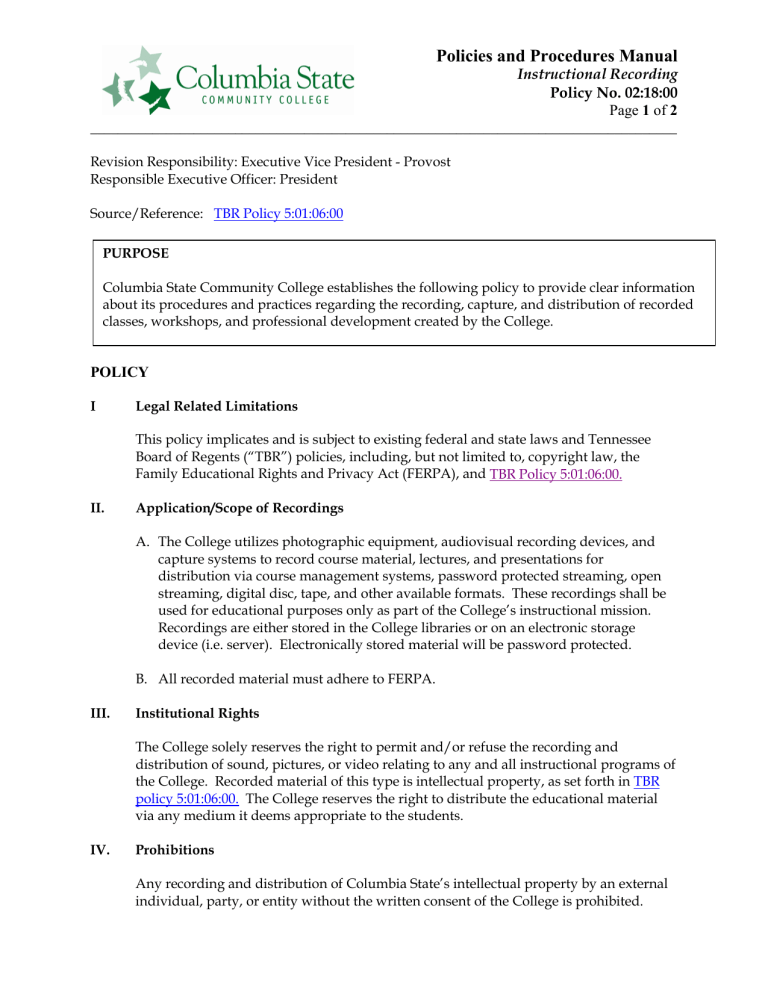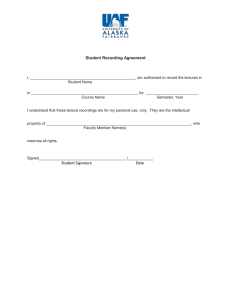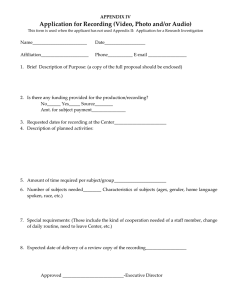Instructional Recording - Columbia State Community College

Policies and Procedures Manual
Instructional Recording
Policy No. 02:18:00
Page 1 of 2
_____________________________________________________________________________________
Revision Responsibility: Executive Vice President - Provost
Responsible Executive Officer: President
Source/Reference: TBR Policy 5:01:06:00
PURPOSE
Columbia State Community College establishes the following policy to provide clear information about its procedures and practices regarding the recording, capture, and distribution of recorded classes, workshops, and professional development created by the College.
POLICY
I Legal Related Limitations
This policy implicates and is subject to existing federal and state laws and Tennessee
Board of Regents (“TBR”) policies, including, but not limited to, copyright law, the
Family Educational Rights and Privacy Act (FERPA), and TBR Policy 5:01:06:00.
II. Application/Scope of Recordings
A.
The College utilizes photographic equipment, audiovisual recording devices, and capture systems to record course material, lectures, and presentations for distribution via course management systems, password protected streaming, open streaming, digital disc, tape, and other available formats. These recordings shall be used for educational purposes only as part of the College’s instructional mission.
Recordings are either stored in the College libraries or on an electronic storage device (i.e. server). Electronically stored material will be password protected.
B.
All recorded material must adhere to FERPA.
III. Institutional Rights
The College solely reserves the right to permit and/or refuse the recording and distribution of sound, pictures, or video relating to any and all instructional programs of the College. Recorded material of this type is intellectual property, as set forth in TBR policy 5:01:06:00.
The College reserves the right to distribute the educational material via any medium it deems appropriate to the students.
IV. Prohibitions
Any recording and distribution of Columbia State’s intellectual property by an external individual, party, or entity without the written consent of the College is prohibited.
Policies and Procedures Manual
Instructional Recording
Policy No. 02:18:00
Page 2 of 2
_____________________________________________________________________________________
Employees and Students are not authorized to capture, download, or play the recording for any purpose other than for their own learning. Student violators will be subject to
Student Conduct and Discipline policy as outlined in the Student Handbook included in the College Catalog posted on the College website.
V.
Notice of Recordings
Recording of any course material, lectures, presentations, conversations or exchanges of communications without the knowledge and consent of all participating personnel is prohibited. Faculty and students engaged in class learning will know that recording is an activity associated with the class and that the recording is for the benefit of the group’s learning and not for distribution or sharing with any individual or entity not directly affiliated with Columbia State Community College.
VI.
Faculty and Staff Consent
Faculty and staff must consent to the recording and availability of recorded course material, lectures, and/or presentations that contain their voice and likeness. The recording may only be accessible to those who are enrolled in or responsible for the
College’s educational program. An exception to the required faculty consent occurs when there is passive participation, such as audience participation, or where the principle instructor, presenter, or moderator has given approval for recording by signing a consent form. The principle instructor, presenter or moderator must notify engaged/passive participants either verbally or in writing that the session is being recorded in whole or in part. Any verbal notification should be included as part of the recorded course material, lectures, and/or presentations.
VII.
Student Consent
Except where FERPA regulations apply, student consent is deemed to occur under the following conditions:
A.
The principle instructor has provided a written statement in the syllabus stating that course lectures and student presentations may be recorded for educational purposes. Students officially enrolled in the course are bound by the syllabus.
B.
Course assignments require the recording of the student’s voice and likeness.
C.
The student is participating in an open or general forum as an engaged/passive participant in which the principle instructor, presenter, or moderator has given approval for recording.
March 15, 2011 new; August 3, 2011 (titles and reports to president updated); September 12, 2011(new policy format and updated titles)

